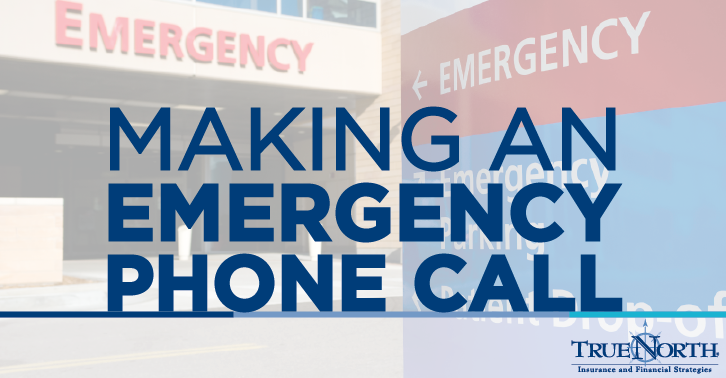When to Make an Emergency Call
posted by TrueNorth Risk Management on Wednesday, February 8, 2017

In a stressful situation, it is difficult to think clearly or know exactly what to do. Your initial reaction may be to call 911 for emergency assistance, but this may not be the most appropriate response to the situation. It may also incur unnecessary emergency care costs and can waste valuable community resources that could be used for situations which require emergency attention.
When to Call 911
- When you see smoke or fire.
- When someone's life or property are in immediate danger, such as:
- An allergic reaction
- Bloody diarrhea
- Chest pain
- Confusion or dizziness
- Drug overdose
- Heart attack
- Heat stroke
- Rectal bleeding
- Shortness of breath
- Slurred speech
- When you witness a crime being committed.
Unless you need an immediate response, call your local non-emergency line for instances such as these:
- Your care was broken into yesterday.
- You need to report additional items stolen on a burglary report filed last week.
What to Expect When Calling 911
If you are in need of emergency assistance, you must be prepared to assist the dispatcher by giving him pertinent information about the emergency. You will be asked questions to determine what type of care is needed for your situation.
The dispatcher will ask you about the following:
- Location of the problem. Provide the address where the problem is, where you are calling from (if different) and any building names or numbers (apartment numbers, condominium names, etc.) that may help responders identify the property easier.
- Nature of the Problem. Tell the dispatcher exactly what occurred or what is currently happening.
- Persons Involved. Explain how many people were involved, their physical descriptions (race, gender, height, weight, clothing, hair color, facial hair, eyeglasses, etc.), whether they were using a weapon, etc.
- Vehicle Description. If a vehicle was involved, describe its make, model, color, license plate number and number of doors. Also tell the dispatcher which direction it was traveling.
Any information you can give to the operator is relayed to the emergency personnel responding to your incident, making them better prepared to help and increasing the chances of a successful outcome. Do not hang up on the dispatcher until the police, fire or emergency personnel who arrive at your location tell you to do so.
How Can I Prepare for Calling 911?
If you are injured or ill and cannot call for emergency assistance by yourself, then your child may have to do so for you. Make sure your children know the following information so they can aid you in an emergency:
- Your name and his or her name.
- Your address, phone number and directions to your home from the nearest main road or landmark.
Protection, no matter where you are.
Get your coverage through TrueNorth so you can rest assured that the things and people you love are protected and accounted for. Call us at 319-364-5193, and a personal insurance agent will gladly look over your plan. Find out more about our personal solutions and obtain a quote for home and auto insurance at www.iTrueNorth.com.
About Author
In addition to helpful weekly guidance on home and auto, TrueNorth provides a number of insurance options to protect your family from risk. For information on a home or auto quote, visit www.iTrueNorth.com or call us at (319) 739-1277. We'd like nothing more than to help safeguard the things that matter most to you.
Obtain a quote on home or auto
Learn more about TrueNorth Risk Management
... read more about author